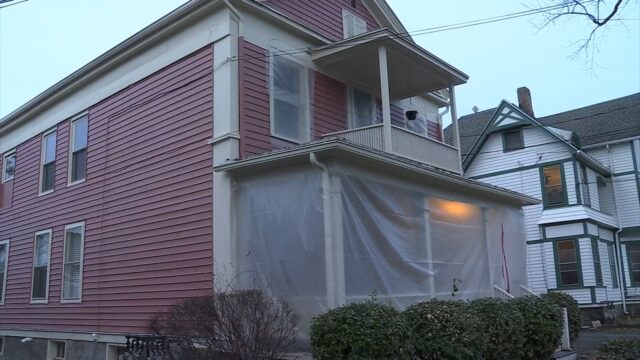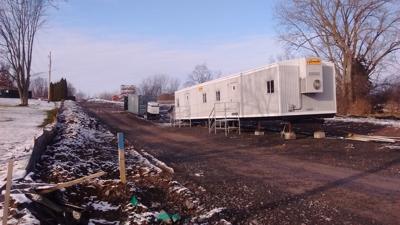The U.S. Environmental Protection Agency announced fines against the Finger Lakes LPG Storage LLC in Savona and Twin Lakes Chemical Inc. in Lockport for Clean Air Act violations or rules governing chemical safety and risk management. Among the violations, the companies failed hazard identification and equipment safety requirements. Finger Lakes LPG agreed to pay a $154,000 penalty and Twin Lakes Chemical agreed to pay a $40,000 penalty for the violations.
“Chemical facilities are required to establish risk management plans in order to prevent and prepare for chemical accidents,” said Judith A. Enck, EPA’s Regional Administrator. “By taking steps, such as properly labeling chemicals, properly training employees, and providing employee emergency health care, chemical facilities can protect the communities where they are located.”
Risk management plan requirements under the Clean Air Act include developing a hazard assessment to identify potential effects of an accidental release of chemicals; an accidental release prevention program that includes safety precautions, safe operating procedures, maintenance and employee training measures; and an emergency response program that spells out emergency health care, employee training measures and procedures for informing the public and local response agencies should an accidental release occur.
Hazardous chemicals are located in many types of facilities in our communities. Emergency responders need to know where hazardous chemicals are used and stored, how to assess the risks associated with those chemicals and how to ensure community preparedness for accidents or incidents that may occur. Many facility owners and operators rely on local resources for emergency preparedness and response, including first responders, emergency medical services and hazardous materials response teams. It is important for local officials, first responders and facility owners and operators to work closely together to ensure chemical safety and security and the protection of local communities.
The first settlement is with Finger Lakes LPG Storage, the owner and operator of a facility that receives and stores liquefied petroleum gas for wholesale customers. The EPA identified several areas of the facility’s operations that had been in violation of the Clean Air Act, including by failing to comply with hazard identification and equipment safety requirements such as updated and accurate piping and instrumentation diagrams, among other violations.
Finger Lakes LPG Storage will also spend an estimated $158,000 to purchase equipment and vehicles for three local fire departments in the area near the facility: the Savona Fire Department, the Bath Volunteer Fire Department in Steuben County and the Watkins Glen Fire Department in Schuyler County.
The second settlement is with Twin Lakes Chemical, a chemical manufacturing plant which, at the time of EPA’s inspection, was using and storing 32,000 pounds of phosgene. Phosgene is a toxic industrial chemical used to make plastics and pesticides. At room temperature it is a deadly gas.
The EPA identified several areas of the facility’s operations that had been in violation of the Clean Air Act, including failing to adequately support, secure, and label phosgene equipment and pipes; and failure to comply with hazard identification and equipment safety requirements. All of the violations were addressed by the company prior to the settlement.
Twin Lakes Chemical will also spend an estimated $100,000 to purchase hazardous materials equipment for the Lockport fire department.
After the violations were brought to light by the EPA, the companies began working with EPA making the necessary improvements. Twin Lakes Chemical has certified that it is now in compliance with the risk management plan provisions of the Clean Air Act, and Finger Lakes LPG Storage has retained a third-party auditor to address its remaining compliance concerns.
EPA records indicate Crestwood has repeatedly failed to comply with basic required accident-prevention practices such as (see consent order, attached):
- assuring that equipment meets accepted engineering standards;
- assuring that flare stacks are safe;
- testing tanks, pipes, valves, pumps, controls, and emergency shut-offs for safety;
- assuring that procedure changes don’t make a process unsafe;
- reviewing new procedures for safety before starting; and
- assuring that on-site contractors have safe procedures.
Safety violations at Crestwood’s Bath/Savona facility, which spanned nearly a decade are outlined below:
November 2007: The EPA found multiple public safety violations of accident-prevention regulations (like those above) at Crestwood predecessor Inergy’s Bath/Savona, NY gas storage facility.
March 2008: Four workers at Bath/Savona were injured when a contractor damaged a storage well, and leaking gas ignited. That September the EPA ordered the company to come into compliance with its safety rules.
November 2010: The EPA issued a “final order” for the 2007 violations, and Crestwood paid a fine of more than $50,000.
March 2011: Crestwood submitted to DEC a public environmental impact statement (DSEIS) for gas storage expansion plans next to Seneca Lake. It described equipment owned by the local emergency response providers, and listed the public safety rules it said it would follow. Crestwood failed to mention that the same management team had been breaking the same accident-prevention safety rules just thirty miles away.
July 2013: The EPA again reported multiple public safety violations at Bath/Savona.
June 2015: Despite the EPA’s documentation of Crestwood’s violations, and even though the same Crestwood team still runs both storage facilities, DEC staff affirmed after a February 2015 Issues Conference that Crestwood’s draft permit for expansion at Seneca Lake “is protective of the environment and public safety.” DEC staff failed to take into consideration Crestwood’s continuing safety violations just down the road.
September 2016: According to EPA documents Crestwood admitted that violations at Bath/Savona facility were unresolved. The EPA has now issued a second order against Crestwood, which has agreed to pay more than $300,000–half in fines and half in contributions to local fire departments. Payments include $85,000 to the Watkins Glen Fire Department.
After almost a decade, Crestwood and the EPA now write that they are still “working to address the violations.” This time, however, EPA has required Crestwood hire an independent external auditor to verify that the safety work is done, and to pay $500-1500 more for every day the work remains overdue.
“Crestwood spokesperson Bill Gautreaux is the Crestwood official who has repeatedly assured the public that Crestwood’s gas storage expansion on Seneca Lake is safe, yet he is the same individual who just admitted to safety violations and signed the EPA’s final report at Bath/Savona, agreeing to pay a settlement six times higher in 2016 than the company was required to pay in 2010,” said Yvonne Taylor, Vice President of Gas Free Seneca.
“The Finger Lakes region’s long history of salt facility accidents, leaks, collapses, and ground subsidences–all with public safety consequences, make gas storage expansion on Seneca Lake a really bad idea,” said Joseph Campbell, President of Gas Free Seneca. “Is this the kind of safety track record we expect from a company storing gas under our feet? Maybe it’s their business, but this is our home, our health, our beautiful lake, and our lives. They have proven that they are a bad corporate neighbor, and we don’t want them in the Finger Lakes. We implore Governor Cuomo to hear the pleas of 1.2 Million NY residents and nearly 500 regional businesses, and just say no to Crestwood on Seneca Lake.”
“Hundreds of regional wineries and small business owners have been asking Governor Cuomo to deny Crestwood’s gas storage permits for 5 and a half years. Now we learn that Crestwood has consistently violated safety requirements right down the road. Enough is enough. They are not the kind of neighbor we want in Finger Lakes Wine Country. It’s time for Cuomo to listen to his constituents and say no to Texas -based Crestwood,” said Lou Damiani, co-owner of Damiani Wine Cellars.
“It appears that Crestwood has a proven track record all right; of not complying with basic safety requirements,” said Doug Hazlitt, co-owner of Hazlitt 1852 Vineyards. “If they can’t be responsible as a corporation and follow the rules then we can’t trust them to store propane safely on Seneca Lake. If there is a one in a million chance that something catastrophic can happen, that’s too big a chance. Governor Cuomo needs to do the right thing, stand up for his constituents and deny Crestwood the permits.”














